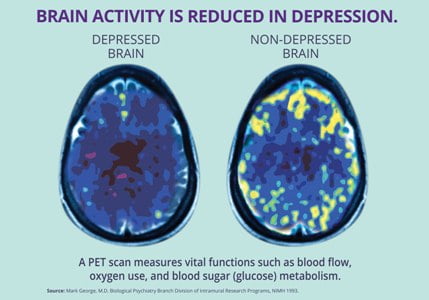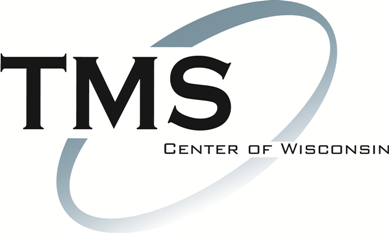Depression & TMS Therapy
Depression results in a persistent state of sadness or a loss of the ability to experience pleasure. Those experiencing depression often lose interest in everyday activities or hobbies that were once enjoyed. According to the standard diagnosis guide (DSM-V) published by the American Psychiatric Association, depression is diagnosed when an individual is experiencing either a depressed mood or a loss of interest or pleasure plus four or more of the following symptoms during the same two-week period:
- Significant weight loss (when not dieting) or weight gain (a change of more than five percent of body weight in a month)
- Significant increase or decrease in appetite
- Excessive sleepiness or insomnia
- Agitation and restlessness
- Fatigue or loss of energy nearly every day
- Feelings of worthlessness or excessive and inappropriate guilt nearly every day
- Diminished ability to think, concentrate, or make decisions
- Recurrent thoughts of death or suicide
If you feel you are experiencing any of these depression symptoms, contact your doctor and speak with them about your depression treatment options. Transcranial Magnetic Stimulation, also referred to as TMS Therapy, may provide an alternative depression treatment for those who have not benefitted from prior antidepressant medication.
Frequently Asked Questions About Depression
What is major depression?
The major depressive disorder affects approximately 16 million American adults, or about 6.7 percent of the U.S. population age 18 and older in a given year.1 It is a condition that lasts two or more weeks and interferes with a person’s ability to carry out daily tasks and enjoyed activities that previously brought pleasure.
What causes major depression?
The exact cause of depression is not known, but the leading scientific theory is that depression is caused by decreased activity in the neural networks of the brain that regulate mood and motivation. Within these neural networks, specific chemicals are released between neurons to communicate information. These chemicals are aptly named ‘neurotransmitters.’ Previously, inactivity within the mood networks of the brain was thought to be the result of a deficiency of these neurotransmitters. We are now learning that depression is much more complicated than merely being the result of a deficiency of one or more neurotransmitters. A person’s genetic make-up and life history may also determine a person’s tendency to become depressed.
How prevalent is depression?
In 2016 a study conducted by the Center for Behavioral Health Statistics and Quality reported that major depressive disorder will affect approximately 16 million American adults (about 6.7% of the US population) in a given year.
Is depression a serious disease?
Yes. The National Institute of Mental Health maintains that, “Depressive illness can often interfere with normal functioning and cause pain and suffering not only to those who have the disorder, but to those who care about them. Serious depression can destroy family life as well as the life of the ill person.” A national study of depression found that nearly all the respondents who reported a major depressive disorder also reported that their social and/or work lives were negatively affected by their illness.1In 2010, the economic burden of depression was estimated at $210 billion in the US2 and depression was the second leading cause of disability, accounting for almost 20% of all years of life lost to disability and premature death.3 Depression can also be a lethal disease. Each year in the US, over 44,000 people die by suicide, 60% of whom suffer from depression.
What are the symptoms of depression?
According to the standard diagnosis guide (DSM-V) published by the American Psychiatric Association, depression is diagnosed when an individual is experiencing either a depressed mood or a loss of interest or pleasure plus four or more of the following depression symptoms during the same two-week period:
- Significant weight loss (when not dieting) or weight gain (a change of more than five percent of body weight in a month)
- Significant increase or decrease in appetite
- Excessive sleepiness or insomnia
- Agitation and restlessness
- Fatigue or loss of energy nearly every day
- Feelings of worthlessness or excessive and inappropriate guilt nearly every day
- Diminished ability to think, concentrate, or make decisions
- Recurrent thoughts of death or suicide
If you feel you are experiencing any of these depression symptoms, contact your doctor and speak with them about your depression treatment options.
Is there a depression cure?
There is no known cure for depression, but with effective treatment many patients can remain symptom free.
Are some people more likely to become depressed than others?
Yes, depression is known to be hereditary so depression may occur in some people who have a particular genetic makeup that make them more likely to develop depression. However, the exact nature of these genetic characteristics is not known.
Other factors may contribute to an individual’s likelihood of experiencing depression. Some of these risk factors include:
- Individuals suffering from certain medical illnesses such as stroke, heart attack, cancer, Parkinson’s disease, and hormonal disorders
- Individuals experiencing a serious loss, difficult relationship, financial problem, or any stressful change in life pattern.
- Individuals taking certain medications that may increase vulnerability to depression
- Both the use of substances of abuse and the withdrawal from these substances can induce depression
- The experience of trauma, at any time of life, has been found to increase the likelihood of experiencing depression
What are the current approved treatments for depression?
Depression is most often treated with psychotherapy (talk-therapy) and antidepressant medications administered together. Although antidepressants can be effective for many patients, they do not work for everybody. Additionally, since antidepressants are typically taken by mouth, they circulate in the bloodstream throughout the body, often resulting in unwanted side effects. More than 4 million patients do not receive adequate benefit from antidepressant medications and/or cannot tolerate the side effects caused by them. For these patients, alternative treatments are available which usually involve the use of a medical device. These treatments include: transcranial magnetic stimulation (TMS), electroconvulsive therapy (ECT) and vagus nerve stimulation (VNS).
What is Transcranial Magnetic Stimulation?
Transcranial Magnetic Stimulation uses short pulses of magnetic fields to stimulate nerve cells in the area of the brain thought to control mood. These pulsed magnetic fields may have a positive effect on the brain’s neurotransmitters levels. Treating depression with transcranial magnetic stimulation, also referred to as TMS Therapy, may provide an alternative depression treatment for those who have not benefitted from prior antidepressant medication.
Depression Treatment with TMS
Depression symptoms are most often treated with antidepressant medications. It is believed that antidepressant medications work by increasing the levels of neurotransmitters in the brain. These changes have a positive effect on mood and reducing feelings of depression and anxiety. Unfortunately, treating major depression is sometimes more complicated and requires more than antidepressants.
Although antidepressants can be effective for many patients, they do not work for everybody. This condition is sometimes referred to as treatment resistant depression, or drug resistant depression. Although not a scientific term, treatment resistant depression is real and debilitating for those dealing with it.
Additionally, since antidepressant medications are typically taken by mouth, they circulate in the bloodstream throughout the body, often resulting in unwanted side effects such as weight gain, sexual problems, upset stomach, sleepiness, and dry mouth. More than 4 million patients do not receive adequate benefit from antidepressants and/or cannot tolerate the side effects caused by them.
For these patients, alternative treatments for depression are available. These depression therapies have proven to work in some people that do not receive benefit from antidepressants and/or cannot tolerate the side effects caused by them. These treatments include: transcranial magnetic stimulation (TMS), electroconvulsive therapy (ECT) and vagus nerve stimulation (VNS).
Recent research with transcranial magnetic stimulation (TMS) has offered a new alternative treatment for depression. Focused stimulation of targeted regions in the brain with pulsed magnetic fields may have a positive effect on the brain’s neurotransmitters levels. Treating depression with transcranial magnetic stimulation, also referred to as TMS Therapy, provides an alternative depression treatment for those who have not benefitted from prior antidepressant medication.
Transcranial Magnetic Stimulation (TMS)
Transcranial magnetic stimulation therapy uses short pulses of magnetic fields to stimulate nerve cells in the area of the brain thought to control mood. It is sometimes referred to as rTMS which stands for repetitive transcranial magnetic stimulation. TMS patients receiving TMS Therapy remain awake and alert during the procedure.
NeuroStar TMS Therapy ® is an outpatient procedure. The typical treatment course consists of at least 5 treatments per week over a 4-6 week period for 20-30 treatments. Each depression treatment session lasts approximately 19-37 minutes, depending on what the doctor determines is the correct protocol. NeuroStar TMS Therapy is:
Non-invasive, meaning that it does not involve surgery. It does not require any anesthesia or sedation, as the patient remains awake and alert during the treatment.
Non-systemic, meaning that it is not taken by mouth and does not circulate in the bloodstream throughout the body.
FDA cleared for patients who have not benefited from prior antidepressant treatment.


BOOK CONSULTATION
Contact Info
Give us a call to discuss your treatment options
